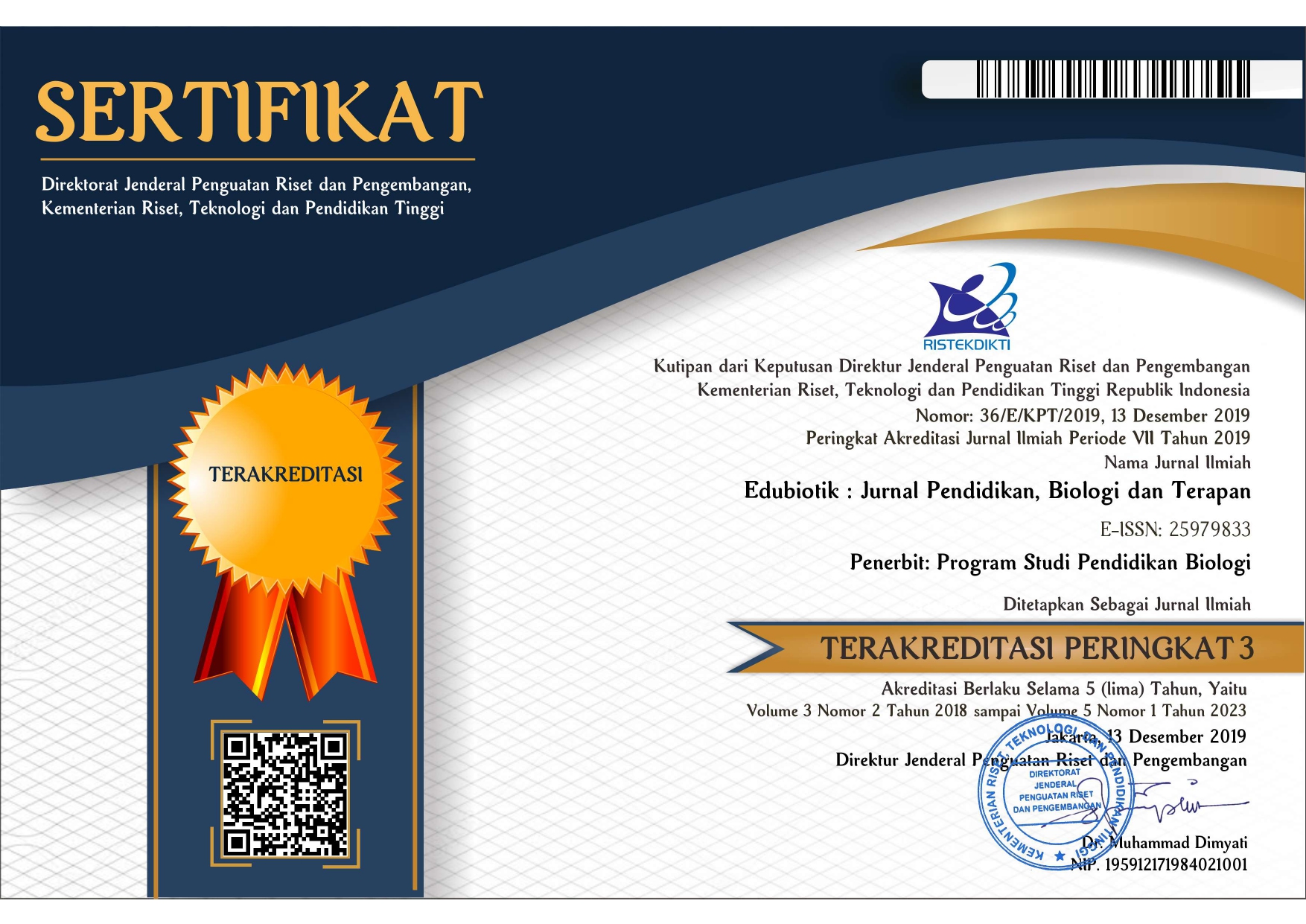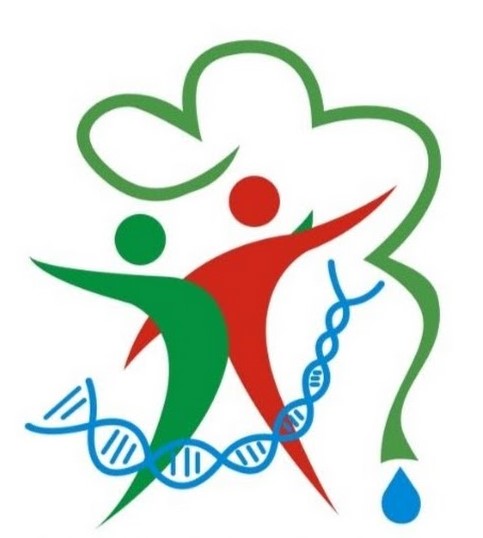An analysis of preservice teachers critical thinking skills at Universitas Islam Balitar
Abstract
The industrial revolution 4.0 in the 21st century presents its own challenges for all groups, including preservice teachers, to be able to quickly adapt to the progress of the times and technology, and solve all problems quickly, precisely, and wisely. To face the challenges of the 21st century, students need good critical thinking skills. By possessing good critical thinking skills, students can plan, monitor, and evaluate the steps they take both in learning activities and in problem solving. This study aims to describe the critical thinking skills of preservice teachers at the Faculty of Teacher Training and Education (FKIP) of Universitas Islam Balitar. This survey research was conducted in April–August 2020 with a total sample of 118 students from the Biology Education, Pancasila and Civic Education, English Education, and Elementary School Teacher Education study programs. Critical thinking skills were measured by an essay test and analyzed with the critical thinking rubric developed by Zubaidah et al. The data were analyzed descriptively. The results showed that the students' critical thinking skills were in the underdeveloped category.
References
Akinmola, E. A. (2014). Developing mathematical problem solving ability: a panacea for a sustainable development in the 21st century. International Journal of Education and Research, 2(2), 1–8. http://www.ijern.com/journal/February-2014/28.pdf
Alawiyah, T., Supriatna, E., & Yuliani, W. (2019). Pengaruh motivasi intrinsik dan kesadaran metakognitif terhadap prestasi akademik siswa. Journal of Innovative Counseling : Theory, Practice, and Research, 3(02), 91–98. https://journal.umtas.ac.id/index.php/innovative_counseling/article/view/571
Anggraeni, D. M., & Sole, F. B. (2022). The analysis of 4-C in moodle-based online learning in science learning media courses. Jurnal Penelitian Pendidikan IPA, 8(3), 1612–1617. https://doi.org/10.29303/JPPIPA.V8I3.1818
Astuti, A. P., Aziz, A., Sumarti, S. S., & Bharati, D. A. L. (2019). Preparing 21st century teachers: Implementation of 4C character’s pre-service teacher through teaching practice. Journal of Physics: Conference Series, 1233(1), 1–9. https://doi.org/10.1088/1742-6596/1233/1/012109
Bertsch, H. (2022). The Effects of a One-to-One Technology Implementation on High School Students’ Communication, Collaboration, Critical Thinking, and Creativity Skills. Dissertations, Theses, and Projects. https://red.mnstate.edu/thesis/713
Boholano, H. B. (2017). Smart social networking: 21st century teaching and learning skills. Research in Pedagogy, 7, 21–29. https://doi.org/10.3316/INFORMIT.913330795923125
Budi, M. I., & Ghofar, A. (2017). Analisis keterampilan berpikir kritis dan metakognitif mahasiswa Program Studi Pendidikan Biologi. Bioma : Jurnal Ilmiah Biologi, 6(1), 1–11. http://journal.upgris.ac.id/index.php/bioma/article/view/1472
Cakici, D. (2018). Metacognitive awareness and critical thinking abilities of pre-service EFL teachers. Journal of Education and Learning, 7(5), 129. https://doi.org/10.5539/JEL.V7N5P116
Çetin, B. (2017). Metacognition and self-regulated learning in predicting University Students’ Academic Achievement in Turkey. Journal of Education and Training Studies, 5(4), 132–138. https://doi.org/10.11114/jets.v5i4.2233
Chatila, H., & Husseiny, F. Al. (2017). Effect of Cooperative Learning Strategy on Students’ Acquisition and Practice of Scientific Skills in Biology. Journal of Education in Science Environment and Health, 3(1), 88–99. https://doi.org/10.21891/JESEH.280588
Choi, E., Lindquist, R., & Song, Y. (2014). Effects of problem-based learning vs. traditional lecture on Korean nursing students’ critical thinking, problem-solving, and self-directed learning. Nurse Education Today, 34(1), 52–56. https://doi.org/10.1016/J.NEDT.2013.02.012
Coskun, Y. (2018). A study on metacognitive thinking skills of University Students. Journal of Education and Training Studies, 6(3), 38–46. https://doi.org/10.11114/jets.v6i3.2931
Davies, M. (2015). A Model of Critical Thinking in Higher Education. 41–92. https://doi.org/10.1007/978-3-319-12835-1_2
Gholami, M., Moghadam, P. K., Mohammadipoor, F., Tarahi, M. J., Sak, M., Toulabi, T., & Pour, A. H. H. (2016). Comparing the effects of problem-based learning and the traditional lecture method on critical thinking skills and metacognitive awareness in nursing students in a critical care nursing course. Nurse Education Today, 45, 16–21. https://doi.org/10.1016/J.NEDT.2016.06.007
Hong, W., Bernacki, M. L., & Perera, H. N. (2020). A latent profile analysis of undergraduates’ achievement motivations and metacognitive behaviors, and their relations to achievement in science. Journal of Educational Psychology, 112(7), 1409–1430. https://doi.org/10.1037/EDU0000445
Iriani, T., & Handoyo, S. S. (2020). Vocational school teacher competence need analysis based on 21st century learning for millennial generation. KnE Social Sciences, 877–885. https://doi.org/10.18502/KSS.V4I14.7943
Karatas, K., & Arpaci, I. (2021). The role of self-directed learning, metacognition, and 21st century skills predicting the readiness for online learning. Contemporary Educational Technology, 13(3). https://doi.org/10.30935/cedtech/10786
Kautzmann, T. R., & Jaques, P. A. (2019). Effects of adaptive training on metacognitive knowledge monitoring ability in computer-based learning. Computers & Education, 129, 92–105. https://doi.org/10.1016/J.COMPEDU.2018.10.017
Lapitan, L. D., Tiangco, C. E., Sumalinog, D. A. G., Sabarillo, N. S., & Diaz, J. M. (2021). An effective blended online teaching and learning strategy during the COVID-19 pandemic. Education for Chemical Engineers, 35, 116–131. https://doi.org/10.1016/J.ECE.2021.01.012
Lukitasari, M., Purnamasari, I., Utami, S., & Sukri, A. (2019). Blended-Problem-Based Learning: How its impact on students’ critical thinking skills? JPBI (Jurnal Pendidikan Biologi Indonesia) , 5(3), 425–434. https://doi.org/10.22219/JPBI.V5I3.10048
Maryuningsih, Y., Hidayat, T., Riandi, R., & Rustaman, N. Y. (2019). Critical thinking skills of prospective biology teacher on the chromosomal basic of inheritance learning through online discussion forums. Journal of Physics: Conference Series, 1157(2), 1–7. https://doi.org/10.1088/1742-6596/1157/2/022090
McGowan, H. E., & Shipley, C. (2020). The Adaptation Advantage: Let Go, Learn Fast, and Thrive in the Future of Work - Heather E. McGowan, Chris Shipley - Google Buku. John Wiley & Sons. https://books.google.co.id/books?hl=id&lr=&id=l8zSDwAAQBAJ&oi=fnd&pg=PR14&dq=With+the+acceleration+of+world+change+ability+to+learn,+adapt,+and+apply+something+quickly+teacher&ots=tSuHAAe9Iu&sig=ptT0W2Ukwa0Co1eTj639rvhFAsw&redir_esc=y#v=onepage&q&f=false
Muhibbudin, M., Yustina, N., & Safrida, S. (2020). Implementation of Project Based Learning (PjBL) model in growth and development learning to increase the students science literacy and critical thinking skills. IJAEDU- International E-Journal of Advances in Education, 6(16), 66–72. https://doi.org/10.18768/IJAEDU.616008
Mullen, C. A. (2020). China case: revealing creativity and 4-c responses. In C. A. Mullen (Ed.), Revealing Creativity (1st ed., Vol. 1, pp. 87–119). Springer, Cham. https://doi.org/10.1007/978-3-030-48165-0_5
Palennari, M. (2016). Exploring the correlation between metacognition and cognitive retention of students using some biology teaching strategies. Journal of Baltic Science Education, 15(5), 617–629. https://www.proquest.com/openview/9595ed6c913aa2106964532d4034d3c1/1?pq-origsite=gscholar&cbl=4477238
Pratama, Y. A., Sopandi, W., & Hidayah, Y. (2019). RADEC Learning Model (Read-Answer-Discuss-Explain And Create): The importance of building critical thinking skills in Indonesian Context. International Journal for Educational and Vocational Studies, 1(2), 109–115. https://doi.org/10.29103/IJEVS.V1I2.1379
Razzouk, R., & Shute, V. (2012). What is design thinking and why is it important?: Http://Dx.Doi.Org/10.3102/0034654312457429, 82(3), 330–348. https://doi.org/10.3102/0034654312457429
Sandika, B., & Fitrihidajati, H. (2018). Improving creative thingking skills and scientific attitude through inquiry-based learning in basic biology lecture toward students of biology education. JPBI (Jurnal Pendidikan Biologi Indonesia), 4(1), 23–28. https://doi.org/10.22219/jpbi.v4i1.5326
Sholihah, M., & Sofiyana, M. S. (2022). Analisis kesadaran metakognitif bagi calon guru di Universitas Islam Balitar. Jurnal Pendidikan Biologi, 12(3), 202–206. https://doi.org/10.17977/UM052V12I3P202-206
Soulé, H., & Warrick, T. (2015). Defining 21st century readiness for all students: What we know and how to get there. Psychology of Aesthetics, Creativity, and the Arts, 9(2), 178–186. https://doi.org/10.1037/ACA0000017
Stewart, C. (2016). Mixed signals: do college graduates have the soft skills that employers want? Competition Forum; Indiana, 14(2), 276–281. https://www.researchgate.net/profile/Alison-Wall/publication/316066488_Mixed_Signals_Do_College_Graduates_Have_the_Soft_Skills_That_Employers_Want/links/5ae86b62aca2725dabb40a10/Mixed-Signals-Do-College-Graduates-Have-the-Soft-Skills-That-Employers-Want.pdf
Stürmer, K., Seidel, T., & Holzberger, D. (2016). Intra-individual differences in developing professional vision: preservice teachers’ changes in the course of an innovative teacher education program. Instructional Science 2016 44:3, 44(3), 293–309. https://doi.org/10.1007/S11251-016-9373-1
Tindangen, M. (2018). Inquiry-Based learning model to improve higher order thinking skills. Asian Social Science, 14(7), 39–46. https://doi.org/10.5539/ass.v14n7p39
van Laar, E., van Deursen, A. J. A. M., van Dijk, J. A. G. M., & de Haan, J. (2017). The relation between 21st-century skills and digital skills: A systematic literature review. Computers in Human Behavior, 72, 577–588. https://doi.org/10.1016/J.CHB.2017.03.010
Yüksel, I., & Yüksel, I. (2012). Metacognitive Awareness of Academic Reading Strategies. Procedia - Social and Behavioral Sciences, 31, 894–898. https://doi.org/10.1016/J.SBSPRO.2011.12.164





.png)
2.png)

1.jpg)


